- Home
- Robert Fulghum
All I Really Need to Know I Learned in Kindergarten
All I Really Need to Know I Learned in Kindergarten Read online
CONTENTS
TITLE PAGE
PERSPECTIVE
CREDO
DEEP KINDERGARTEN
THE REST OF THE STORY
SPIDERS
PUDDLES
HAIHO LAMA
ANGELS
HIDE AND SEEK
CHICKEN-FRIED STEAK
CHARLES BOYER
RACCOONS
LARRY WALTERS
THE TRUTH ABOUT LARRY WALTERS
BALLOON LAUNCH
LAUNDRY
MEDICINE CABINETS
JUMPER CABLES AND THE GOOD SAMARITAN
THE BAD SAMARITAN
BAR STORY
HELP
STUFF
VACUUMS
THE MERMAID
TAXI
SUMMER JOB
WEISER, IDAHO
BIBLE STORY
THE NAMES OF THINGS
WATER
THIRD AID
YELLING
DONNIE
CLUCKY-LUCKY
PICKUP TRUCK
DEAD END
TESTING
BUFFALO TAVERN
GUMMY LUMP
MOTHER TERESA
CENSUS
PASS IT ON
STARGAZING
GRANDFATHER IN TRAINING
GRANDFATHER
MARY’S DAD
MOTHS
NEAR-DEATH EXPERIENCE
MUSHROOMS
TERM LIMITS
CRAYOLAS
MIDWINTER
THE GREAT HEATHEN
HONG DUC
BRASS RULE
CUCKOO CLOCK
VALENTINE CHRISTMAS TREE
CHRISTMAS IN AUGUST
BEETHOVEN’S NINTH
SECRET ANNIVERSARIES—JANUARY
HIGH SCHOOL REUNION
SAN DIEGO ZOO
NEXT SIX STORIES
THE GUY NEXT DOOR
DANDELIONS
STICK-POLISHING
THE ODDS
WHERE THE SNOW GOES
HAIR
REFLECTION
CODA
ABOUT THE AUTHOR
ALSO BY ROBERT FULGHUM
COPYRIGHT
ALL I REALLY
NEED TO KNOW
I LEARNED IN
KINDERGARTEN
PERSPECTIVE
THE MAGIC MOMENT WHEN I FIRST saw Kindergarten in a bookseller’s window remains vivid. I went in and bought one. The clerk didn’t recognize me. She knew little about the book—a slim new volume of essays with a long title—written by an unknown author.
The odds were high in favor of a short life for my first book, and a short career for me as a writer.
Now, a quarter of a century later, Kindergarten remains alive and well. Over six million copies are in print in English alone. It has been published in thirty-seven languages and sold in one hundred and three countries. Word-of-mouth publicity sustains Kindergarten, aided in part by the three thousand productions of the theater piece that was created from it.
Ten years ago Kindergarten was reconsidered, revised, and ex-panded with twenty-five new essays. My thought at the time was, Yes, that’s it. Nothing compels me to make any further changes.
As for the author, I also remain alive and well. Five more books of essays and stories have been published; plus a book on the rituals of life, another about love, a book of quotations, and two novels. And now the manuscript of a memoir, a new book of essays, and a musical are in production.
Furthermore, I’m still going about looking at the world, trying to make sense of what I notice, and passing that along on my web-site: www.robertfulghum.com.
The writing continues because I continue—with the same atti-tude that was the basis for Kindergarten: That which is essential to a flourishing life is elemental and near by in daily life.
If you read the first essays in this book and realize that you know and trust these values, then you know that the truth expressed is not mine—it is yours, as well, and ours.
—Robert Fulghum
CREDO
To begin with, did I really learn everything I need to know in kindergarten? Do I still believe that? Here is the original essay, followed by my editorial reaction.
EACH SPRING, FOR MANY YEARS, I have set myself the task of writing a personal statement of belief: a Credo. When I was younger, the statement ran for many pages, trying to cover every base, with no loose ends. It sounded like a Supreme Court brief, as if words could resolve all conflicts about the meaning of existence.
The Credo has grown shorter in recent years—sometimes cynical, sometimes comical, and sometimes bland—but I keep working at it. Recently I set out to get the statement of personal belief down to one page in simple terms, fully understanding the naïve idealism that implied.
The inspiration for brevity came to me at a gasoline station. I managed to fill my old car’s tank with super deluxe high-octane go-juice. My old hoopy couldn’t handle it and got the willies—kept sputtering out at intersections and belching going downhill. I understood. My mind and my spirit get like that from time to time. Too much high-content information, and I get the existential willies. I keep sputtering out at intersections where life choices must be made and I either know too much or not enough. The examined life is no picnic.
I realized then that I already know most of what’s necessary to live a meaningful life—that it isn’t all that complicated. I know it. And have known it for a long, long time. Living it—well, that’s another matter, yes? Here’s my Credo:
ALL I REALLY NEED TO KNOW about how to live and what to do and how to be I learned in kindergarten. Wisdom was not at the top of the graduate-school mountain, but there in the sandpile at Sunday School. These are the things I learned:
Share everything.
Play fair.
Don’t hit people.
Put things back where you found them.
Clean up your own mess.
Don’t take things that aren’t yours.
Say you’re sorry when you hurt somebody.
Wash your hands before you eat.
Flush.
Warm cookies and cold milk are good for you.
Live a balanced life—learn some and think some and draw and paint and sing and dance and play and work every day some.
Take a nap every afternoon.
When you go out into the world, watch out for traffic, hold hands, and stick together.
Wonder. Remember the little seed in the Styrofoam cup: The roots go down and the plant goes up and nobody really knows how or why, but we are all like that.
Goldfish and hamsters and white mice and even the little seed in the Styrofoam cup—they all die. So do we.
And then remember the Dick-and-Jane books and the first word you learned—the biggest word of all—LOOK.
Everything you need to know is in there somewhere. The Golden Rule and love and basic sanitation. Ecology and politics and equality and sane living.
Take any one of those items and extrapolate it into sophisticated adult terms and apply it to your family life or your work or your government or your world and it holds true and clear and firm. Think what a better world it would be if we all—the whole world—had cookies and milk about three o’clock every afternoon and then lay down with our blankies for a nap. Or if all governments had as a basic policy to always put things back where they found them and to clean up their own mess.
And it is still true, no matter how old you are—when you go out into the world, it is best to hold hands and stick together.
DEEP KINDERGARTEN
AS I WRITE THIS I am sixty-five years ol
d. Not so old, really, but I have been around awhile. Kindergarten is a long way back there. What do I know now?
The Kindergarten Credo is not kid stuff.
It is not simple. It is elemental.
The essay answers the questions asked sooner or later by every one of us who once stared out a classroom window wondering: Why am I here? Why do I have to go to school?
We are sent to school to be civilized—to be introduced to the essential machinery of human society. Early on in our lives we are sent out of the home into the world. To school. We have no choice in this. Society judges it so important that we be educated that we must go. It is the law. And when we get to school we are taught the fundamentals on which civilization rests. These are first explained in language a small child understands.
For example, it would do no good to tell a six-year-old that “Studies have shown that human society cannot function without an equitable distribution of the resources of the earth.” While this statement is profoundly and painfully true, a child cannot comprehend this vocabulary. So a child is told that there are twenty children and five balls to play with; likewise four easels, three sets of blocks, two guinea pigs, and one bathroom. To be fair, we must share.
Likewise a six-year-old will not understand that “By and large it has been demonstrated that violence is counterproductive to the constructive interaction of persons and societies.” True. But a child can better understand that the rule out in the world and in the school is the same: Don’t hit people. Bad things happen. The child must understand this rule is connected to the first rule: People won’t share or play fair if you hit them.
It’s hard to explain the cost and consequences of environmental pollution and destruction to a six year old. But we are paying a desperate price even now because adults did not heed the instructions of kindergarten: Clean up your own mess; put things back where you found them; don’t take what’s not yours.
“The history of society is more defined by its understanding of disease than its formulation of philosophy and political theory.” True. Basic sanitation. Keeping excrement off our hands as well as out of our minds is important. But it’s enough to teach a child to use the toilet, flush, and wash his hands regularly.
And so on. From the first day we are told in words we can handle what has come to be prized as the foundation of community and culture. Though the teacher may call these first lessons “simple rules,” they are in fact the distillation of all the hard-won, field-tested working standards of the human enterprise.
Once we are told about these things, we soon discover we are taking a lab course. We are going to be asked to try and practice these precepts every day. Knowledge is meaningful only if it is reflected in action. The human race has found out the hard way that we are what we do, not just what we think. This is true for kids and adults—for schoolrooms and nations.
I am sometimes amazed at what we did not fully grasp in kindergarten. In the years I was a parish minister I was always taken aback when someone came to me and said. “I’ve just come from the doctor and he told me I have a only a limited time to live.”
I was tempted to shout, “What? You didn’t know? You had to pay a doctor to tell you—at your age? Where were you the week in kindergarten when you got the little cup with the cotton and water and seed? Life happened—remember? A plant grew up and the roots grew down. A miracle. And then a few days later the plant was dead. DEAD. Life is short. Were you asleep that week or home sick or what?”
I never said all that. But I thought it. And it’s true. The idea was for us to have the whole picture right from the beginning. Life-and-death. Lifedeath. One event. One short event. Don’t forget.
There’s another thing not everyone figures out right away: It’s almost impossible to go through life all alone. We need to find our support group—family, friends, companion, therapy gatherings, team, church or whatever. The kindergarten admonition applies as long as we live: “When you go out into the world, hold hands and stick together.” It’s dangerous out there—lonely, too. Everyone needs someone. Some assembly is always required.
What we learn in kindergarten comes up again and again in our lives as long as we live. In far more complex, polysyllabic forms, to be sure. In lectures, encyclopedias, bibles, company rules, courts of law, sermons, and handbooks. Life will examine us continually to see if we have understood and have practiced what we were taught that first year of school.
Across the course of our lives we will wrestle with questions of right and wrong, good and bad, truth and lies. Again and again and yet again, we will come around to that place where we came in—to that room where the elemental notions about humanity were handed to us with great care when we were very young.
Of course it wasn’t literally all you really needed to know. Certainly not. But if you didn’t get this basic stuff to begin with, you and society will pay a heavy price for your failure. If you did learn it and do practice it, then all the rest of what you needed to know has a lasting foundation.
There, now.
The Kindergarten Credo amplified, but unchanged.
That’s what I believe and know and trust at age sixty-five.
THE REST OF THE STORY
“AND SO THEN WHAT HAPPENED?”
An urgent question out of the bedtime darkness, asked by my children, when they and I were young. Just when I thought I had slam-dunked a story ending—just when I was certain the children were safely in the arms of the sandman—a small, sleepy voice would plead, “So, then what happened?” And no matter what I replied, the plea went on, “Please, please, Daddy—tell the rest of the story.”
In cranky desperation, I would resort to apocalypse: “Suddenly a comet hit the earth and blew everything to pieces.”
Silence. “What happened to the pieces?”
“It doesn’t matter. Everybody died a horrible death, especially all the little children who were not asleep.” I also tried, “The father sold all the children who would not go to sleep to a passing gypsy who ground them into sausage meat. The first children to be ground up were those who would not stop asking questions.”
Go ahead, shame me. But it worked. Most of the time. On reflection, I suspect such gory endings were what they really liked most. Perhaps it was a scheme to see just how far I would go—to see how crazed their father really was.
Now I am dealing with grandchildren who have the same restless minds. I am wilier now than I used to be. To the inevitable request for more, I reply, “Only your father knows the rest of the story. Ask him to finish it when you get home.”
The children are right to ask, of course. As long as life exists, something always happens next. There are always consequences—always sequels.
Anticipating future bedtime insistence, I’ve been reviewing my repertoire of stories. And I must say I wonder myself what did happen next?
After the la-di-da with Little Red Riding Hood, did the word get passed among wolves to stay away from smarty-pants little girls who are magnets for trouble? And how come Red’s bed-ridden grandma was living way off in the woods alone instead of in a retirement community or a nursing home?
How about Alice? Could she find her way back into Wonderland in middle age when she could really have used a little excitement in her life? Of course not. Whenever she approached a looking glass, she touched up her makeup.
After the blind men examined the elephant and came back to the king with their paradoxical impressions, did they pool their contradictions and re-examine the elephant? Don’t bet on it. They’d rather have their heads cut off than give up their prejudices. The wise man who had grabbed the tail insisted, “An elephant is like a rope. Everybody else is wrong.” The wise man in the middle declared, “No, an elephant is like four tree trunks. Everybody else is wrong.” And the wise man who encountered the trunk insisted the elephant was a hose—period.
Could Snow White really live happily ever after when the prince knew she had been living with seven little men for some time? N
o way. He’d always bring it up when they had a family fight. “What did you really do with all those little men?”
And Cinderella couldn’t have lived too happily with a prince who couldn’t recognize her unless she was wearing the right slippers.
Remember the story of the emperor’s new clothes? The emperor had been duped by a tailor into believing that the clothes he made were so magnificent that only the pure of heart could wear them. When the emperor strutted his stuff in the non-existent clothes, a kid said what everybody could plainly see: “The emperor is stark naked.” What happened to that kid? He was hauled off home and sent to bed without his supper for being a big mouth and making trouble for his family.
The kid had always been told: “Be truthful, speak your mind, be true to yourself and have the courage of your convictions.” But the kid found out the hard way what the real rules were: “Don’t make waves, keep your mouth shut, cover your butt, don’t be a hero and mind your own business.” Whistle-blowers, like girls who marry a prince, do not live happily ever after. The kid wrestled with this reality as long as he lived.
OK, call me old and cynical. Go on, treat me like the parents treated the kid who called the emperor naked. Tell me I should be like the blind men and not rearrange my stories in the face of further information.
Maybe I know too much and have lived too long. Better I leave truth out of bedtime stories or pass the buck to their parents. It’s too soon to tell them the world is not always nice or fair. Children will find out the rest of the story on their own. Soon enough, there will be sleepless nights when “What will happen next?” will not be a plot inquiry but the entreaty of prayer.
SPIDERS
THIS IS MY NEIGHBOR. Nice lady. Coming out her front door, on her way to work and in her “looking good” mode. She’s locking the door now and picking up her daily luggage: purse, lunch bag, gym bag for aerobics, and the garbage bucket to take out. She turns, sees me, gives me the big, smiling Hello, takes three steps across her front porch. And goes “AAAAAAAAGGGGGGGGGHHHHHHHHH!!!!” (That’s a direct quote.) At about the level of a fire engine at full cry.

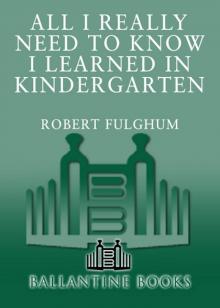 All I Really Need to Know I Learned in Kindergarten
All I Really Need to Know I Learned in Kindergarten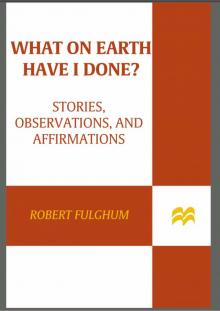 What On Earth Have I Done?
What On Earth Have I Done?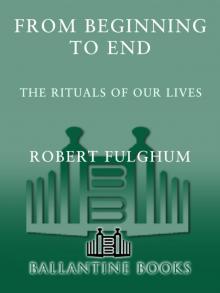 From Beginning to End
From Beginning to End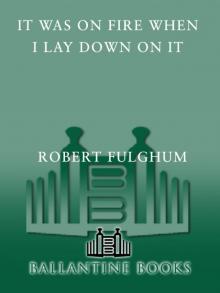 It Was On Fire When I Lay Down On It
It Was On Fire When I Lay Down On It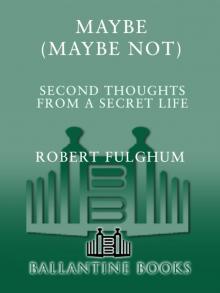 Maybe (Maybe Not)
Maybe (Maybe Not)